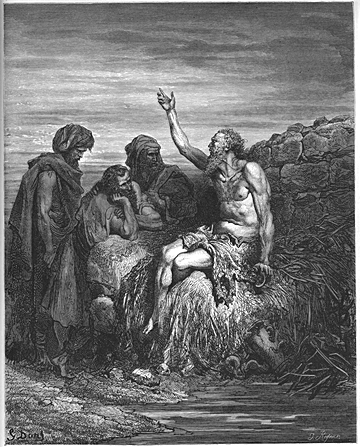Ayubu 2
1 Ningĩ nĩ kwarĩ mũthenya ũngĩ araika maathiire kũrũgama mbere ya Jehova, na Shaitani o nake agĩthiĩ hamwe nao kũrũgama mbere yake.
Forsothe it was doon, whanne in sum dai the sones of God `weren comun, and stoden bifor the Lord, and Sathan `was comun among hem, and stood in his siyt,
2 Nake Jehova akĩũria Shaitani atĩrĩ, “Uuma kũ?” Nake Shaitani agĩcookeria Jehova atĩrĩ, “Nyuma kũriũnga thĩ o na gũcangacanga kuo kũndũ na kũndũ.”
that the Lord seide to Sathan, Fro whennus comest thou? Which answeride, and seide, Y haue cumpassid the erthe, `and Y haue go thury it.
3 Ningĩ Jehova akĩũria Shaitani atĩrĩ, “Nĩũcũũranĩtie ũhoro wa ndungata yakwa Ayubu? Ũkoona atĩ kũu thĩ gũtirĩ mũndũ ũhaana take; ndarĩ ũcuuke na nĩ mũrũngĩrĩru, mũndũ mwĩtigĩri-Ngai na ũtheemaga maũndũ marĩa mooru. Ningĩ no arũmĩtie wĩhokeku wake, o na gũtuĩka nĩwaningĩrĩirie ndĩmwanange hatarĩ gĩtũmi.”
And the Lord seide to Sathan, Whethir thou hast biholde my seruaunt Joob, that noon in erthe is lijk hym; he is a symple man, and riytful, and dredynge God, and goynge awei fro yuel, and yit holdynge innocence? `But thou hast moued me ayens him, that `Y schulde turmente hym in veyn.
4 Nake Shaitani agĩcookeria Jehova, akiuga atĩrĩ, “Gĩkonde kĩrĩhagwo na gĩkonde! Mũndũ no arute indo ciake ciothe nĩguo ahonokie muoyo wake.
To whom Sathan answeride, and seide, `A man schal yyue skyn for skyn, and alle thingis that he hath for his lijf;
5 No rĩrĩ, ta tambũrũkia guoko gwaku ũhutie mahĩndĩ na nyama cia mwĩrĩ wake, na ti-itherũ ndarĩ hĩndĩ ategũkũruma o ũthiũ-inĩ waku.”
`ellis sende thin hond, and touche his boon and fleisch, and thanne thou schalt se, that he schal curse thee in the face.
6 Nake Jehova akĩĩra Shaitani atĩrĩ, “No wega, rĩu arĩ moko-inĩ maku; no ndũkahutie muoyo wake.”
Therfor the Lord seide to Sathan, Lo! he is in `thin hond; netheles kepe thou his lijf.
7 Nĩ ũndũ ũcio Shaitani akiuma hau mbere ya Jehova, akĩnyamaria Ayubu na ironda ciarĩ na ruo mũno kuuma makinya ma magũrũ make nginya mũtwe.
Therfor Sathan yede out fro the face of the Lord, and smoot Joob with `a ful wickid botche fro the sole of the foot `til to his top;
8 Nake Ayubu akĩoya gacere ka nyũngũ ethũage nako, agĩikara thĩ harĩa haitagwo mũhu.
which Joob schauyde the quytere with a schelle, `and sat in the dunghil.
9 Nake mũtumia wake akĩmũũria atĩrĩ, “Anga no ũrũmĩtie wĩhokeku waku o na rĩu? Ruma Ngai wĩkuĩre!”
Forsothe his wijf seide to hym, Dwellist thou yit in thi symplenesse? Curse thou God, and die.
10 Nake Ayubu akĩmũcookeria atĩrĩ, “Wee ũraaria ta mũndũ-wa-nja mũkĩĩgu. Kaĩ turĩkĩamũkagĩra o maũndũ mega kuuma kũrĩ Ngai, na tũtiamũkĩre mathĩĩna?” Thĩinĩ wa maũndũ macio mothe-rĩ, Ayubu ndaigana kwĩhia thĩinĩ wa mĩario yake.
And Joob seide, Thou hast spoke as oon of the fonned wymmen; if we han take goodis of the hond of the Lord, whi forsothe suffren we not yuels? In alle these thingis Joob synnede not in hise lippis.
11 Na rĩrĩ, hĩndĩ ĩrĩa arata atatũ a Ayubu, nĩo Elifazu ũrĩa Mũtemaani, na Bilidadi ũrĩa Mũshuhi, na Zofaru ũrĩa Mũnaamathi, maaiguire mathĩĩna marĩa mothe maakorete Ayubu-rĩ, makĩgĩa gĩathĩ, makiuma o mũndũ gwake na magĩcemania nĩguo mathiĩ makamũcakaithie o makĩmũhooreragia.
Therfor thre frendis of Joob herden al the yuel, that hadde bifelde to hym, and camen ech man fro his place, Eliphath Temanytes, and Baldach Suythes, and Sophar Naamathites; for thei `hadden seide togidere to hem silf, that thei wolden come togidere, and visite hym, and coumforte.
12 Rĩrĩa maamuonire marĩ o haraaya-rĩ, makĩrigwo nĩwe nĩ ũrĩa aahaanaga; makĩambĩrĩria kũrĩra maanĩrĩire, na magĩtembũranga nguo ciao, o na makĩĩhurĩria rũkũngũ mĩtwe.
And whanne thei hadden reisid afer `her iyen, thei knewen not hym; and thei crieden, and wepten, and to-renten her clothis, and spreynten dust on her heed `in to heuene.
13 Ningĩ magĩcooka magĩikara thĩ hamwe nake matukũ mũgwanja, mũthenya na ũtukũ, na gũtirĩ mũndũ wamwaragĩria kiugo o na kĩmwe, nĩgũkorwo nĩmoonire atĩ kũnyamarĩka gwake kwarĩ kũnene mũno.
And thei saten with hym in the erthe seuene daies and seuene nyytis, and no man spak a word to hym; for thei sien, that his sorewe was greet.





















